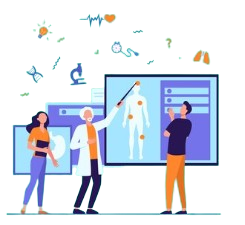Big Data in Healthcare is transforming the way healthcare providers deliver patient care. From improving patient outcomes to enhancing operational efficiency, the potential of data analytics in healthcare is vast. However, healthcare organizations must address challenges such as data security and integration to unlock the full potential of Big Data in Healthcare.
The healthcare industry is undergoing a significant transformation thanks to Big Data in Healthcare. This revolutionary technology is changing how healthcare providers care for patients, improve outcomes, and streamline operations. As the amount of healthcare data grows rapidly, Big Data in Healthcare offers powerful tools to make smarter decisions and enhance care delivery at all levels.
In this post, we’ll dive into how Big Data is reshaping patient care, improving efficiency, and creating a better healthcare system overall. We’ll explore the benefits, applications, and challenges of implementing Big Data in this field.
What is Big Data in Healthcare?
Big Data in this field refers to the large volume of diverse data generated by the healthcare industry. It includes patient records, medical imaging, genetic data, and real-time data from wearable devices. This data is typically structured, semi-structured, or unstructured, and it comes from various sources like hospitals, clinics, insurance companies, and personal health trackers.
By leveraging analytics and machine learning, Big Data helps identify patterns, trends, and insights that were previously difficult to detect. It enables these field providers to make more accurate diagnoses, predict health risks, and personalize patient care based on data-driven insights.

How Big Data in Healthcare Improves Patient Care
One of the most impactful applications of Big Data in this field is personalized medicine. By analyzing patient data, including genetic information, these field providers can create personalized treatment plans that are more effective for individual patients. This approach ensures patients receive treatments specifically suited to their health needs, improving recovery times and overall well-being.
For example, Big Data can predict diseases like cancer or diabetes early on by analyzing genetic markers and lifestyle factors. Early detection allows for timely interventions and reduces the chances of complications, leading to better long-term health outcomes.
Additionally, Big Data supports predictive analytics. In this field, professionals can use continuous monitoring tools such as wearable devices to track real-time data. This data can help predict potential health issues before they become critical, allowing for proactive care.
Enhancing Operational Efficiency
Big Data in this field also plays a critical role in improving the operational efficiency of healthcare organizations. By analyzing large volumes of data, these field providers can identify inefficiencies, streamline operations, and reduce costs. For instance, data analytics can help hospitals manage patient flow, predict bed occupancy, and optimize staffing levels based on real-time needs.
Moreover, Big Data in Healthcare aids in resource management. These field providers can better allocate resources, such as medical equipment and personnel, based on insights derived from data. This leads to smoother operations and better resource utilization, ensuring that healthcare facilities operate efficiently while providing the best care possible.
Real-Time Monitoring and Wearables
One of the exciting advancements in Big Data in this field is the integration of wearable devices that collect real-time data from patients. Devices like fitness trackers and smartwatches monitor everything from heart rate to sleep patterns, providing continuous health data.
The integration of real-time data through Big Data allows healthcare providers to respond quickly to patient needs. For example, if a patient’s blood pressure suddenly spikes, healthcare professionals can be alerted immediately and take action. This proactive approach to care helps prevent emergencies and reduces the need for hospitalizations.
Furthermore, Big Data helps manage chronic diseases. Patients with conditions like hypertension or diabetes benefit from continuous monitoring, which can alert healthcare providers about changes before they become severe.
Supporting Data-Driven Decision Making
Big Data in this field empowers healthcare administrators and providers to make data-driven decisions. By analyzing data from across their organizations, administrators can identify trends, predict patient outcomes, and make informed decisions about care. This ensures that healthcare organizations use their resources most effectively and improve patient care quality.
For example, Big Data enables a better understanding of patient behavior, such as frequent readmissions or poor adherence to prescribed treatments. By recognizing these patterns, healthcare providers can take proactive steps to reduce avoidable hospitalizations and improve patient outcomes.
Furthermore, Big Data plays a role in optimizing healthcare management. By monitoring various aspects of patient care, healthcare administrators can reduce wait times, improve the quality of services provided, and even predict and address health crises more quickly.
Overcoming Challenges
While Big Data in this field offers immense benefits, there are several challenges that healthcare organizations must overcome. One of the biggest concerns is data security and privacy. With the vast amount of sensitive patient data involved, these field providers must safeguard this information and comply with regulations like HIPAA.
Another challenge is data integration. Healthcare data comes from numerous different sources, such as EHR systems, lab results, and wearable devices. To make the most of Big Data in this field, this data must be integrated and analyzed in a unified system. Without integration, it becomes difficult to gain actionable insights from the data.
Additionally, there is a need for skilled professionals who can handle the complex analysis and interpretation of healthcare data. Training staff to understand and work with Big Data in this field is critical to the success of any data-driven initiative.
Conclusion
Big Data in Healthcare is a game-changer that’s transforming how healthcare providers deliver patient care and manage operations. By leveraging data analytics, healthcare organizations can personalize treatments, predict health risks, and enhance operational efficiency. While there are challenges to overcome, the potential benefits of Big Data in this field are vast and impactful.
At Tanbits, we offer Big Data services tailored to the healthcare sector, helping healthcare providers harness the power of data to improve patient care and operational efficiency.
Big Data in this field is revolutionizing healthcare and embracing it will ensure that organizations are ready to meet the needs of the future.
BACK










